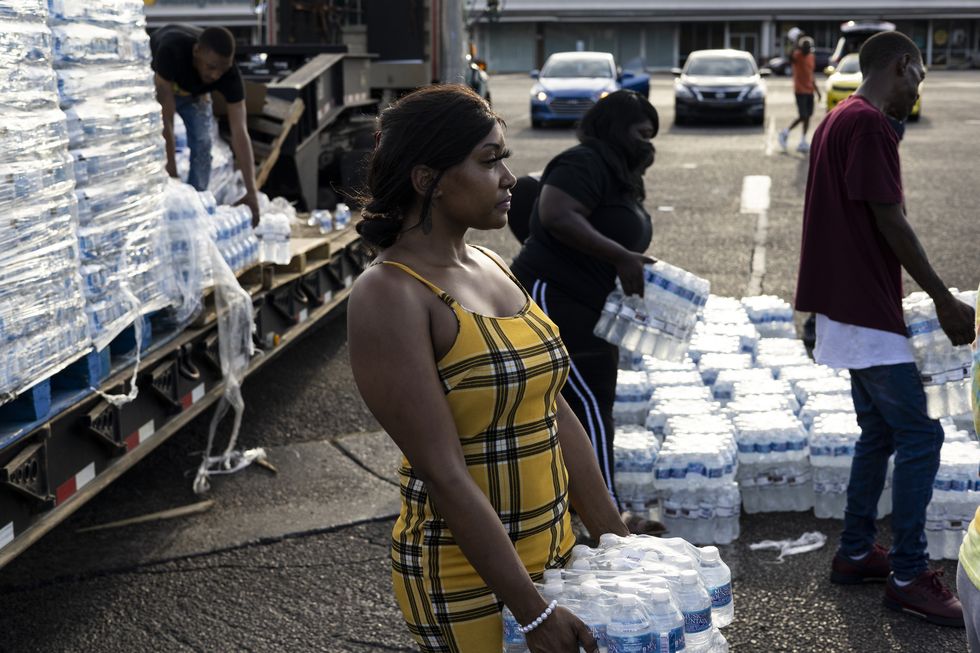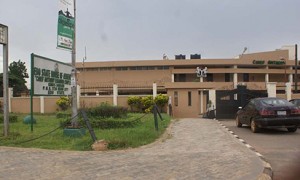What It’s Like to Lose Water in Jackson, Mississippi
On Tuesday, August 30, news broke that Jackson, Mississippi–the state capitol and a metro area home to nearly 431,000 people—was in a water crisis. Residents were warned that water was undrinkable. This, as the heat index climbed to 120 degrees. By late Tuesday night, both Mississippi’s governor, Tate Reeves, and President Biden had declared state and federal emergencies. The National Guard had been dispensed to hand out water.
Mississippi is the Blackest state in the Union, with a population that is 37.8 percent African American. Jackson is no different; 82 percent of the city’s population is Black. The neglect of the city’s water supply is part of a much longer, older story of the state government’s abandonment of public works after the end of Jim Crow. After Brown v. Board of Education, white residents of Jackson fled rather than support integrated schools, and their tax dollars went with them. Jackson has a poverty rate of 24.5 percent, compared with the 11 percent national average. All of these things have led to a legacy of managed neglect that brought us to this current moment.
As pundits scrambled to blame different political parties for the current emergency, the people of Jackson did what Black people in Mississippi have always done: They got to work imagining radical ways to help one another. Mississippi is home to all of the problems I’ve mentioned above. But it’s also the birthplace of freedom–true freedom–in this country. Mississippi is Fannie Lou Hammer, the Freedom Riders, the Freedom Schools, and Hamer’s Freedom Farm Cooperative. These movements of the ’50s, ’60s, and ’70s formulated radical ideas about democracy, self-reliance, the environment, and history that the rest of the country has barely caught up to more than half a century later. The Mississippi imagined and inhabited by Black folks and their allies has always existed in the tension between those two spaces–the chains of the past and the boundless imagination of what a future freedom might look like.
This crisis is no different. Maisie Brown is a 22-year-old resident of Jackson and a student at Jackson State University. She’s lived in the city nearly her whole life; her parents (her father is an educator, and her mother is a dentist) moved the family to Jackson in 2005 from Mississippi’s Gulf Coast. “One thing you get used to, especially if you work and go to school in Jackson—you get used to the boil-water notices. It’s kind of like a part of Jackson, honestly,” she says. Jackson’s water emergency has been well-known to residents and state officials since at least 2014, with some press even going so far as declaring the city “the next Flint” more than six years ago.
The people of Jackson did what Black people in Mississippi have always done: They got to work imagining radical ways to help one another.
“We’ll have the boil-water notices here and there, maybe a couple days, or maybe a week on a bad month,” Brown says. “But the unique thing about this one was…we went on boil-water notice and we just never came off. And so I think that’s when people’s antennae went up. Even though we knew Jackson’s infrastructure needed some help, needed some work, I don’t think people knew the extent of how bad it is.”
Brown usually watches the local news to relax. “That’s just kind of a wind-down time for me, even though it’s kind of chaotic,” she says, laughing. So when her local news sounded the alarm about this emergency, she jumped into action.
Brown organized about 20 of her fellow Jackson State students to buy water in bulk and deliver it to residents in need. She put a call out on social media for donations, and in less than 24 hours, she raised $2,000 from donors. “I had people tag and say, ‘Hey, love from New Jersey.’ ‘Love from Brooklyn, New York.’ It’s people from all over the country who want to help us,” she says.
She and her fellow organizers used the money to buy bottled water from surrounding supermarkets and travel to stores in other counties when supplies ran low. They set up a hotline, which people could text with their address and household needs. Then Brown and her co-volunteers made deliveries. “I have 20 cases in my trunk right now,” she tells me. They also hope to use the money to order water online, to help ease the bottled-water shortages. She’s aware that even the use of social media leaves out the most vulnerable, who may not have access. “I know a lot of our target audience may not be on social media as much, so I’m going to try to get some literature printed this week that we could just go and do door to door. Just leaving flyers, letting people know what we’re doing, especially in some of the communities that I know are a lot of elderly people.”
We went on boil-water notice and we just never came off. That’s when people’s antennae went up.
“While there are so many organizations around the city setting up stations where you can come and get water,” Brown explains, “there weren’t as many, at least from what we saw, that were actually doing deliveries for those who can’t make it to those things. I just had someone messaging me, like, ‘Hey, I have a friend who has multiple sclerosis, who’s homebound. Could you drop off some water over there to them?’ I’ve had people call for their elderly parents in the area.… They don’t live here, but their parents live here, and they’re not as mobile as them. One of the cities on the outskirts of Jackson…they get their water from Jackson as well. They’ve been battling the same issue. And [a woman from there] texts and says, ‘Hey, I’m disabled. I have a lot of issues with my legs. Can somebody drop off two cases over here?’”
It’s a spontaneous community response to the mess of a bigger structural problem. “It becomes frustrating when you live in a state where it feels like the people who are in leadership don’t care as much about you because you don’t look like them,” Brown says. Jackson is a Black, Democratic city in a state where political power lies in the Republican, largely white-led, party. “We are a community that is used to being self-reliant. So there are a lot of people in this community who are always willing to lend a helping hand to others because we are used to not really getting that assistance that we need and deserve.”
“We are a shrinking community, unfortunately,” she continues, “who are just trying to do the best that we can to keep moving. And it’s just so many here in Jackson who want better for that community and who are trying their best with what they have in order to do that.”
She alludes to the economic minefield that comes out of emergencies like this: “We have businesses who are extremely frustrated with the current situation. Businesses are struggling really bad,” she says. “People are frustrated. People are irritated. People are not happy with what’s going on, but like I said, if you’re a Mississippian, you’ve had to get used to being resilient. And so we’re trying our best to make it work.”
It becomes frustrating when you live in a state where it feels like the people who are in leadership don’t care as much about you because you don’t look like them.”
The situation in Mississippi is one that could happen anywhere in the United States; for decades, researchers and reporters have warned about our crumbling infrastructure and the risk to water. A water crisis isn’t unique to Mississippi, but the rest of the country can learn from the extraordinary organizing and community care that organizers like Brown spring into place in the face of crisis.
HOW CAN YOU HELP
To help the water crisis in Mississippi, you can donate to the following organizations currently on the ground in Jackson:
The Mississippi Rapid Response Coalition: The Mississippi Rapid Response Coalition (The Coalition), led by the People’s Advocacy Institute, the Mississippi Poor People’s Campaign, Immigrant Alliance for Justice and Equity, One Voice, MS, Alternate ROOTS, Mississippi Moves, Operation Good, Strong Arms of Mississippi, and over 30 partner organizations are working diligently to meet the clean-water needs of the communities directly impacted by the deteriorating infrastructure in Jackson, Mississippi.
The group Maisie Brown put together is called the MS Student Water Crisis Advocacy Group.


